BOOK REVIEW - NERVOUS CONDITIONS
- Muthoni
- Jan 24, 2021
- 3 min read
Nervous Conditions by Tsisti Dangarembga #Zimbabwe #Africanliterature

Format: Paperback
Publisher: Women Press (UK) – 1st pub
Published: 1988
Genre: Literary Fiction / Feminist Fiction
Setting: Zimbabwe
Rating: 3.8 Stars
Source: Gifted by Prestige Bookshop, Nairobi
Synopsis:
A modern classic in the African literary canon and voted in the Top Ten Africa's 100 Best Books of the 20th Century, this novel brings to the politics of decolonization theory the energy of women's rights. An extraordinarily well-crafted work, this book is a work of vision. Through its deft negotiation of race, class, gender and cultural change, it dramatizes the 'nervousness' of the 'postcolonial' conditions that bedevil us still. In Tambu and the women of her family, we African women see ourselves, whether at home or displaced, doing daily battle with our changing world with a mixture of tenacity, bewilderment and grace.
My Thoughts……
What does it mean for a young girl growing up in colonial Africa in the 60s/70s - trying to emancipate herself from the throngs of patriarchy, get an education and prove that she is just as smart (er) and capable as anyone else? For Tambudzai, this opportunity came when her brother died elevating her to the eldest child in the family worthy of an education, and so she does not feel particularly sad about his sudden death. You see, in Tambu’s family, which really is a reflection of the social structures, opportunities are afforded to men first. There is a hierarchy and women always come second. Nhamo, her elder brother who gets to attend the Mission school sponsored by the relatively wealthy and benevolent uncle, Babamukuru represents everything she has been denied.
Even in retrospect, Tambu still maintains that her brother’s death was pivotal to her own life taking off, placing her in a position to tell this story. Her-story and that of the women in her life; and the men too.
Reading this book, I felt the weight of womanhood, heavy like a dead donkey. A weight unfortunately placed on women more often than not, not by society but by the men in their lives. For Tambu, the patriarchy was represented by the men in her life – her father, Jeremiah who saw no value in her educations because ‘a woman cannot cook books for her husband.’ Her Uncle, Babmukuru, whose existence is in itself such a contradiction. Benevolent and kind and will remain so as long as his authority is not questioned or challenged. He also has no qualms about lording his generosity over you and threatening its withdrawal if he is disobeyed. And, her brother, Nhamo, who believed he was superior because he was born male.
There are so many contrasts in this book, I almost want to call it the book of contrasts – modernity vs tradition, colonialism vs independence, male vs female, rich vs poor, literate vs illiterate, rebelling vs conforming. The question of gender and the place of women in the African setting is especially poignant in this story as Tambu and the women in her life – her cousin Nyasha, her mother, her aunts Maiguru and Lucia navigate their existence amidst these opposites and reckon with a society that seems biased against them from the start.
Whilst this is not exactly a page turner and I struggled the first few times I attempted to read it, probably due to the weightiness of the story, it is such a worthy read if you stick with it.





Through the men in Tambu’s life, Geometry Dash the narrative demonstrates that patriarchy is not abstract but personal and intimate. Figures like Jeremiah, Babamukuru, and Nhamo embody different forms of male dominance—overt dismissal, benevolent authoritarianism, and inherited entitlement—showing how control over women is normalized and even masked as kindness or tradition. Babamukuru’s contradiction is especially telling: education and progress exist, but only as long as male authority remains unchallenged.